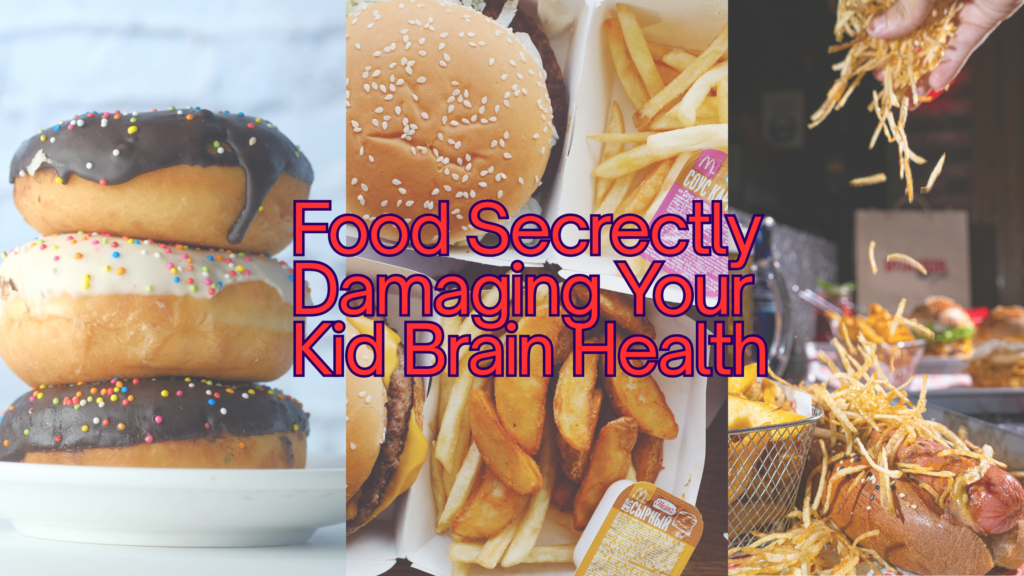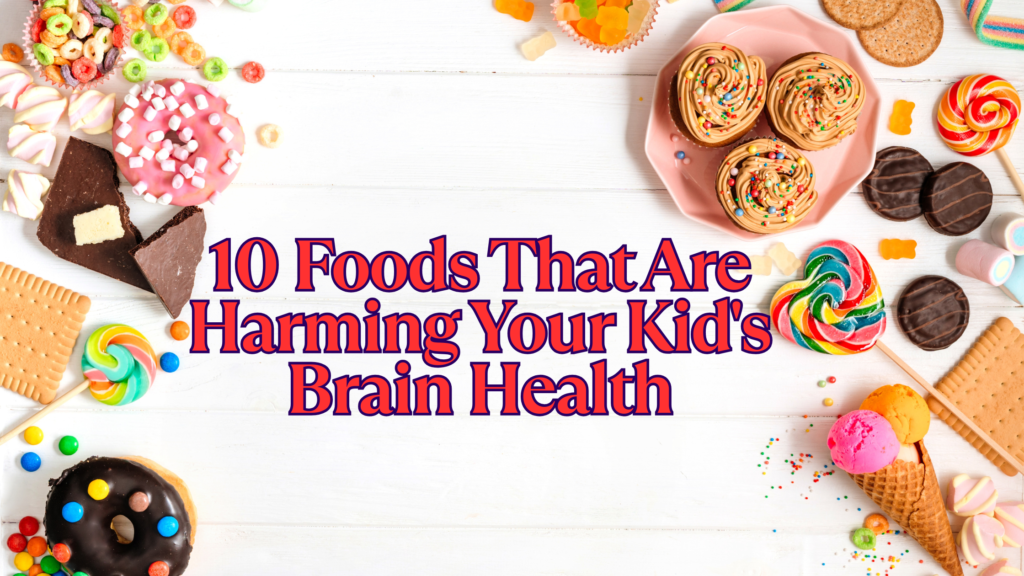As parents, we’re deeply invested in giving our children the best especially when it comes to nutrition. But what if the snacks and meals we’re serving are silently impacting their brain development, focus, and mental health?
Here’s a hard truth: Many popular foods yes, even the ones labeled “kid friendly” can negatively affect your child’s cognitive growth, memory, and emotional balance.
In this blog post, we explore 10 foods that are harming your Kids brain health, the science behind their effects, and healthier alternatives you can adopt today.

1. Sugary Cereals and Beverages
What’s the problem?
Sugary breakfast cereals and sweetened juices may kick start the day with energy but it’s often short lived. These foods spike blood sugar, followed by a crash that affects concentration and mood.
Brain impact:
- High sugar intake leads to inflammation in the brain.
- Can impair memory and reduce hippocampus function (critical for learning).
- Associated with ADHD like behavior in children.
Solution:
- Switch to low sugar, whole grain cereals.
- Use real fruit or cinnamon for sweetness.
- Serve fresh coconut water or fruit infused water instead of packaged juices.
2. Artificial Food Colors (in candies, jellies, chips)
What’s the problem?
Brightly colored candies and packaged snacks often contain synthetic dyes like Red 40, Yellow 5, and Blue 1 linked to behavioral issues.
Brain impact:
- Studies have shown links between artificial food dyes and hyperactivity.
- May disrupt neurotransmitter activity, affecting focus and emotional control.
- UK and EU regulations now require warning labels on such products.
Solution:
- Choose naturally colored snacks made from beetroot, turmeric, or spirulina.
- Read ingredient labels before buying candies or gummies.
3. Processed Meats (sausages, nuggets, salami)
What’s the problem?
Processed meats contain sodium nitrite, excessive salt, and unhealthy fats that are hard on a growing brain.
Brain impact:
- Nitrates may interfere with oxygen flow to the brain.
- High salt intake is linked to impaired cognitive function over time.
- Saturated fats affect the formation of brain cell membranes.
Solution:
- Choose grilled or baked fresh meats with natural herbs.
- Choose homemade chicken or lentil patties instead of store bought nuggets.
4. Refined Carbohydrates (white bread, pasta, biscuits)
What’s the problem?
Refined carbs are quickly broken into sugar and can lead to similar effects as sugary foods.
Brain impact:
- Causes blood sugar spikes, leading to brain fog and mood swings.
- Lacks fiber, which is essential for gut health—closely tied to mental well-being.
- Can disrupt neurotransmitter function due to poor nutrient density.
Solution:
- Use whole grain breads and pastas.
- Include quinoa, brown rice, or millet in daily meals.
5. Packaged Snacks and Chips
What’s the problem?
They are high in trans fats, sodium, and preservatives an unhealthy trio for brain development.
Brain impact:
- Trans fats reduce brain derived neurotrophic factor (BDNF), a key element in memory and learning.
- High sodium intake may lead to dehydration, affecting brain performance.
- Preservatives can cause neurological inflammation in sensitive kids.
Solution:
- Replace chips with roasted makhana (fox nuts), dry fruits, or whole grain crackers.
- Serve air popped popcorn with olive oil and herbs.
6. Carbonated and Energy Drinks
What’s the problem?
Loaded with caffeine and sugar, these drinks may seem harmless but are quite dangerous for a child’s developing brain.
Brain impact:
- Caffeine overexcites the nervous system and disrupts sleep cycles.
- Sugar increases dopamine levels artificially, potentially leading to dependency or mood issues.
- Affects attention span and long term memory.
Solution:
- Encourage natural hydration infused water, buttermilk, or fresh smoothies.
- For flavor, try lemon water with mint and honey.
7. Frozen Desserts and Ice Creams
What’s the problem?
These treats are filled with sugar, artificial flavors, and emulsifiers that can cause gut imbalance and impact mood.
Brain impact:
- Sugar overload reduces cognitive flexibility.
- Poor gut health translates to anxiety and mood issues.
- Emulsifiers may increase inflammation, affecting the brain-gut axis.
Solution:
- Make homemade banana ice cream or frozen yogurt.
- Use natural fruits like mangoes or berries for sweetness.
8. Excessive Chocolate (especially milk chocolate)
What’s the problem?
Most commercial chocolate for kids is more sugar and fat than cocoa—stripping away any potential benefits.
Brain impact:
- Excess sugar damages synapses, the connections between brain cells.
- Can increase hyperactivity and reduce impulse control.
- High in saturated fats that affect neural plasticity.
Solution:
- Choose 70%+ dark chocolate in small amounts.
- Try cocoa smoothies with dates for natural sweetness.
9. Instant Noodles and Ready Meals
What’s the problem?
These quick fix meals contain monosodium glutamate (MSG), excessive sodium, and low-quality carbs.
Brain impact:
- MSG is known to over-stimulate brain cells, leading to headaches and fatigue.
- Poor nutrient value means the brain is starved of essential vitamins like B6 and iron.
- Long-term intake could impair cognitive performance.
Solution:
- Replace with homemade whole grain noodles or poha with vegetables.
- Make quick one-pot meals using oats, lentils, or rice with ghee.
10. Bakery Goods (cakes, pastries, cream rolls)
What’s the problem?
Loaded with refined flour, sugars, artificial creams, and trans fats.
Brain impact:
- Spikes insulin and impacts brain glucose regulation.
- Trans fats and artificial ingredients may harm neurodevelopment in young children.
- Often leads to sugar crashes that affect focus, alertness, and behavior.
Solution:
- Bake at home with healthier flours like almond, oat, or ragi.
- Use jaggery or dates instead of white sugar.
What Should Parents Do?
Encourage Brain-Boosting Foods:
- Omega 3 rich foods like walnuts, chia seeds, and flaxseeds.
- Leafy greens: spinach, methi.
- Berries for antioxidants.
- Protein-rich snacks like boiled eggs, tofu, paneer.
Set Realistic Rules:
- Avoid extremes. It’s okay for kids to indulge occasionally.
- Use the 80/20 rule : 80% of food should be nourishing, 20% can be fun.
Educate Your Kids:
- Talk to them about how food affects mood and memory.
- Involve them in meal prep it builds food awareness.
Final Thoughts on 10 Foods That Are Harming Your Kids Brain Health
Food isn’t just fuel , it’s medicine, especially for a child’s growing brain. By becoming more aware of what goes into your child’s body, you’re not just feeding their belly you’re nourishing their focus, creativity, memory, and emotional well being.
The key isn’t perfection it’s consistency and awareness. Swap harmful choices with wholesome ones, build good food habits early, and raise a generation that’s mentally sharp and emotionally strong.
Disclaimer:
This blog post is intended for informational purposes only. The content is based on publicly available information and general research. It should not be considered as professional medical or dietary advice. Always consult a qualified healthcare provider or pediatrician before making any changes to your child’s diet or health routine.
10 Foods That Are Harming Your Kids Brain Health : Frequently Asked Questions (FAQs)
1. Why is sugar considered harmful for a child’s brain?
Answer: Excessive sugar intake can cause inflammation in the brain, disrupt memory and learning functions, and lead to attention issues. It also causes blood sugar spikes and crashes, resulting in mood swings and lack of focus.
2. Are all packaged snacks harmful for kids?
Answer: Not all, but many packaged snacks are high in trans fats, preservatives, and artificial additives. These ingredients may interfere with cognitive development and cause hyperactivity. It’s always best to read the labels and opt for minimally processed snacks.
3. What are better alternatives to sugary cereals for kids?
Answer: Whole grain cereals with no added sugar, oatmeal with fruits, or homemade granola with nuts and seeds are healthier options. You can sweeten them naturally with honey, dates, or mashed bananas.
4. Can occasional treats really affect brain health?
Answer: Occasional consumption is generally not harmful. The problem arises when these foods become a regular part of the child’s diet. Following an 80/20 rule where 80% of meals are nutritious is a good way to balance.
5. How does junk food affect mental health in children?
Answer: Junk food can lead to nutritional deficiencies, blood sugar instability, and poor gut health all of which are linked to anxiety, irritability, poor concentration, and even behavioral problems in children.
6. What is the link between gut health and brain function in kids?
Answer: The gut and brain are connected via the gut brain axis. A healthy gut supports better mood regulation and cognitive performance. Processed foods harm gut bacteria, leading to emotional and mental imbalances.
7. Should children completely avoid chocolate?
Answer: No, but it’s important to moderate intake. Choose dark chocolate with at least 70% cocoa, and avoid milk chocolates that are loaded with sugar and additives. Small portions of high quality chocolate can be enjoyed occasionally.
8. What foods actually boost brain health in children?
Answer: Foods rich in omega 3 fatty acids (like walnuts and flaxseeds), leafy greens, berries, eggs, and whole grains are great for brain development. These foods improve memory, attention span, and emotional well being.
9. How can parents encourage healthy eating habits in picky eaters?
Answer: Involve kids in grocery shopping and cooking, introduce one new food at a time, make meals colorful and fun, and avoid pressuring them. Setting a good example and making healthy food accessible is key.
10. Are homemade versions of these “bad” foods okay?
Answer: Yes, making homemade versions allows you to control ingredients. For example, you can bake nuggets using fresh chicken and oats, or make ice cream using bananas and yogurt without harmful additives.
For more such Health and Lifestyle Tips, please follow Popnewsblend.
For Indian Government Run Initiatives Follow Ministry of Health & Family Welfare.

Hi, I’m Prashant Jain — a curious soul, storyteller, and content creator at heart.I’ve always been drawn to the world of entertainment, travel, sports, health & lifestyle — not just as a writer, but as someone who genuinely lives these experiences. Whether I’m binge-watching the latest OTT series, exploring offbeat spiritual destinations in India, or diving deep into wellness routines and cricket match insights, I love sharing what I discover with like-minded readers.
PopNewsBlend is my way of blending personal journeys with meaningful stories — ones that inform, inspire, and keep you ahead of the curve. Everything I write comes from real observations, hands-on experiences, and a deep passion for understanding the world around us.
Discover more from Popnewsblend
Subscribe to get the latest posts sent to your email.








Pingback: Back to School After Summer Break: 10 Essential Parent Tips
Pingback: How to Reduce Screen Time for Kids: Effective Tips for Healthy Digital Habits
Pingback: 10 Brain Boosting Foods to Pack in Your Child Lunchbox
Pingback: 10 Gentle Parenting Secrets to Raise Kind, Respectful, and Well-Behaved Kids
Pingback: Pocket Money for Kids: When and How to Teach Money Sense at Age 8